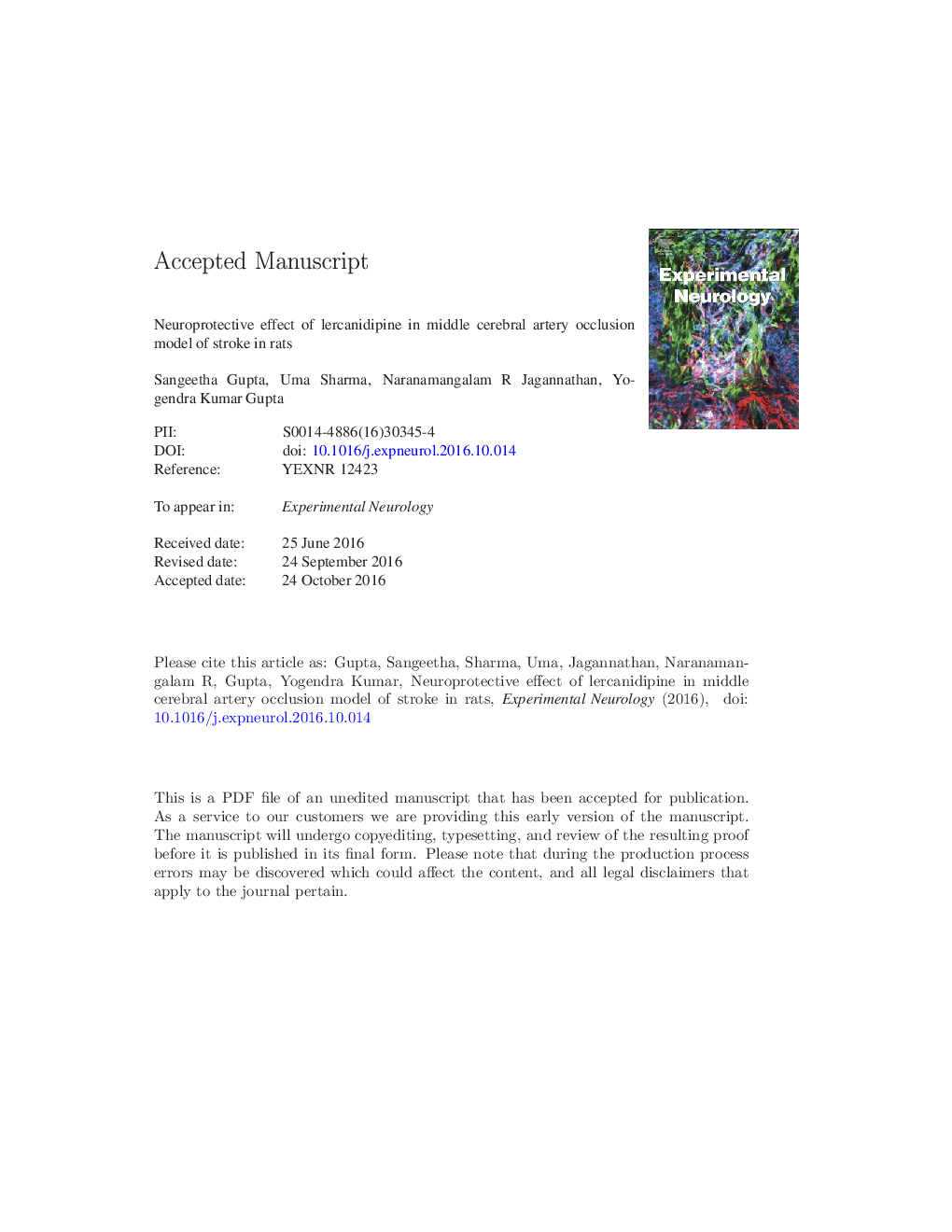| کد مقاله | کد نشریه | سال انتشار | مقاله انگلیسی | نسخه تمام متن |
|---|---|---|---|---|
| 5629192 | 1580151 | 2017 | 51 صفحه PDF | دانلود رایگان |
عنوان انگلیسی مقاله ISI
Neuroprotective effect of lercanidipine in middle cerebral artery occlusion model of stroke in rats
ترجمه فارسی عنوان
اثر نوروپروتئینی لرکانیدیپین در مدل انسداد شریان مغزی میانی سکته مغزی در موش صحرایی
دانلود مقاله + سفارش ترجمه
دانلود مقاله ISI انگلیسی
رایگان برای ایرانیان
کلمات کلیدی
MMPFDAHEDrCBFLDFDWIMCAOi.p.TTCADC2,3,5-triphenyltetrazolium chloride - 2،3،5-trihenyltetrazolium chloridert-PA - RT-PAMRI - امآرآی یا تصویرسازی تشدید مغناطیسیmiddle cerebral artery occlusion - انسداد شریان (سرخرگ) مغزی میانیdiffusion-weighted imaging - تصویربرداری با وضوح تصویربرداریMagnetic resonance imaging - تصویربرداری رزونانس مغناطیسیRegional cerebral blood flow - جریان خون منطقه ای مغزیIntraperitoneally - داخل صفاقیHuman equivalent dose - دوز معادل انسانیFood and Drug Administration - سازمان غذا و داروapparent diffusion coefficient - ضریب انتشار آشکارlaser Doppler flowmetry - فلومتر Doppler لیزرMatrix metalloproteinases - متالوپروتئیناز ماتریکس
موضوعات مرتبط
علوم زیستی و بیوفناوری
علم عصب شناسی
عصب شناسی
چکیده انگلیسی
Oxidative stress, inflammation and apoptotic neuronal cell death are cardinal mechanisms involved in the cascade of acute ischemic stroke. Lercanidipine apart from calcium channel blocking activity possesses anti-oxidant, anti-inflammatory and anti-apoptotic properties. In the present study, we investigated neuroprotective efficacy and therapeutic time window of lercanidipine in a 2 h middle cerebral artery occlusion (MCAo) model in male Wistar rats. The study design included: acute (pre-treatment and post-treatment) and sub-acute studies. In acute studies (pre-treatment) lercanidipine (0.25, 0.5 and 1 mg/kg, i.p.) was administered 60 min prior MCAo. The rats were assessed 24 h post-MCAo for neurological deficit score (NDS), motor deficit paradigms (grip test and rota rod) and cerebral infarction via 2,3,5-triphenyltetrazolium chloride (TTC) staining. The most effective dose was found to be at 0.5 mg/kg, i.p., which was considered for further studies. Regional cerebral blood flow (rCBF) was monitored till 120 min post-reperfusion to assess vasodilatory property of lercanidipine (0.5 mg/kg, i.p.) administered at two different time points: 60 min post-MCAo and 15 min post-reperfusion. In acute studies (post-treatment) lercanidipine (0.5 mg/kg, i.p.) was administered 15 min, 120 min and 240 min post-reperfusion. Based on NDS and cerebral infarction via TTC staining assessed 24 h post-MCAo, effectiveness was evident upto 120 min. For sub-acute studies same dose/vehicle was repeated for next 3 days and magnetic resonance imaging (MRI) was performed 96 h after the last dose. Biochemical markers estimated in rat brain cortex 24 h post-MCAo were oxidative stress (malondialdehyde, reduced glutathione, nitric oxide, superoxide dismutase), blood brain barrier damage (matrix metalloproteinases-2 and -9) and apoptotic (caspase-3 and -9). Lercanidipine significantly reduced NDS, motor deficits and cerebral infarction volume as compared to the control group. Lercanidipine (60 min post-MCAo) significantly increased rCBF (86%) as compared to vehicle treated MCAo group (64%) 120 min post-reperfusion, but failed to show vasodilatation with 15 min post-reperfusion group. Lercanidipine (13.78 ± 2.78%) significantly attenuated percentage infarct volume as evident from diffusion-weighted (DWI) and T2-weighted images as compared to vehicle treated MCAo group (25.90 ± 2.44%) investigated 96 h post-MCAo. The apparent diffusion coefficient (ADC) was also significantly improved in lercanidipine group as compared to control group. Biochemical alterations were significantly ameliorated by lercanidipine till 120 min post-reperfusion group and MMP-9 inhibition observed even with 240 min group. Thus, lercanidipine revealed significant neuroprotective effect mediated through attenuation of oxidative stress, inflammation and apoptosis.
ناشر
Database: Elsevier - ScienceDirect (ساینس دایرکت)
Journal: Experimental Neurology - Volume 288, February 2017, Pages 25-37
Journal: Experimental Neurology - Volume 288, February 2017, Pages 25-37
نویسندگان
Sangeetha Gupta, Uma Sharma, Naranamangalam R Jagannathan, Yogendra Kumar Gupta,
